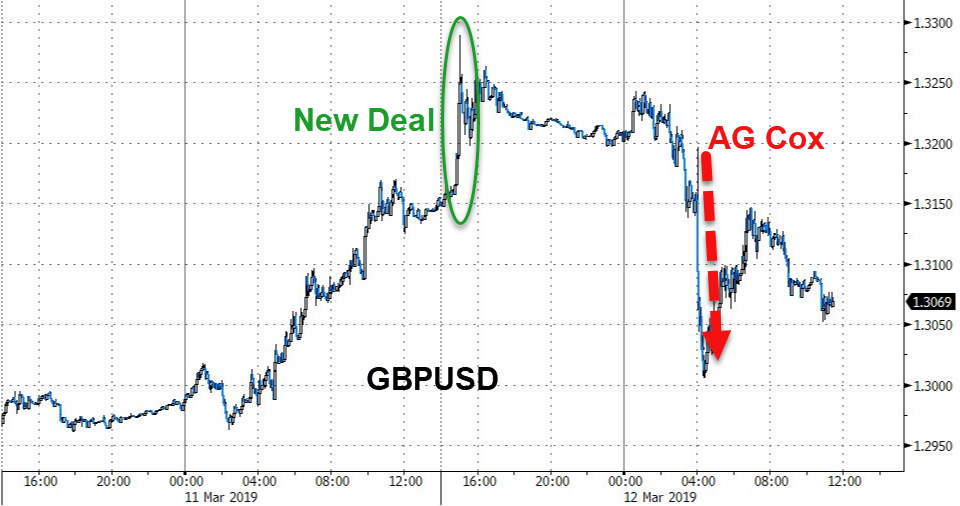Britain’s parliament is about to vote on Prime Minister Theresa May’s revised Brexit deal with the EU after rejecting her previous plan by a record margin in January.
Heading into the vote, cable is leaking back lower…
Here is Ransquawk‘s detailed layout of what to expect (and what happens next)
VOTE TIME:
Expected to begin at around 1900 GMT (1500 EDT, 2000 CET).
AMENDMENTS:
There are no amendments tabled, and as such, it will be a ‘clean’ vote on May’s Brexit plan.
VOTING MATHS:
There are 650 members of the UK House of Commons, seven Sinn Fein MPs do not vote, four speakers do not vote, and four MPs who count the votes do not vote themselves. PM May needs 318 votes to pass her deal, assuming all lawmakers (who are able to) vote, including: 10 DUP votes, up to 65 ERG votes (from a total of 110), up to 40 Labour leave votes, and 4 Independent votes.
VOTE MARGIN:
May’s Brexit bill was rejected overwhelmingly in January, by a margin of 230 votes (432 against vs 202 in favour). One theory is that if the margin of defeat is small, it may give May scope to make changes after the 21 March EU Summit, so the deal could be voted on again. However, ITV’s political editor suggested that the vote would be lost by more than 100, leaving little scope for May to introduce a third meaningful vote. Sky News analysis suggests UK PM May will lose tonight’s vote by more than 100 votes (projects 345 to vote against deal, 220 will vote for deal, 72 unknown).
AG COX:
UK AG Cox noted that while the path to exit the backstop is clear and binding, and the likelihood of a EU/UK disagreement in the arbitration process is low, and a unilateral right to exit the backstop was not achieved. NOTE: a unilateral right to leave was a key red-line for the ERG and DUP, the likely king-makers in the upcoming meaningful vote. The ERG and DUP have both therefore said that they will not back the deal; the DUP will directly vote against, but some members of the ERG may abstain from the vote (the latter is likely to be more beneficial to UK PM May).
* CHANCES OF PASSING TODAY:
Betting markets price in defeat for PM May. The implied probability of her deal passing fell to around 11% (vs 25-30% before the AG’s opinion was published. Accordingly, many desks say the base case is still for the deal to be rejected on Tuesday, a no-deal Brexit ruled out on Wednesday, and lawmakers will vote for the Article 50 process to be extended on Thursday.
* GBP SCENARIO 1: Meaningful Vote fails (Tue)/no-deal blocked (Wed/Thu)/vote to extend A50 passes (Wed/Thu) (likely). Barclays says initial GBP reaction would be negative. Focus will then shift to 21 March summit, where any signs of a longer extension could lead to a rally.
* GBP SCENARIO 2: Meaningful Vote passes (somewhat likely). Barclays says it could open the door for new post-referendum highs.
* GBP SCENARIO 3: All votes fail (unlikely). Barclays sees GBP real effective exchange rate -2.5% as markets price higher probability of no-deal Brexit. Focus then shifts to 21 March summit where GBP will be almost entirely sensitive to Brexit newsflow.
* GBP SCENARIO 4: meaningful vote fails/MPs vote for no-deal (highly unlikely): Barclays says GBP REER -5%.
WHAT HAPPENS NEXT? POSSIBLE ARTICLE 50 EXTENSION – 18/APR? 23/MAY? 23/Jun?:
If MPs vote to extend the Article 50 process, in addition to the UK’s approval, every EU member would be required to agree. The message from the EU has been mixed; while some think it is a sensible idea, others say the process should only be extended if there is a good reason for it.
Assuming that the EU agrees, the process could be pushed from the UK’s current Brexit leave date 29 March, to 18 April – the last day that the European Parliament can vote before breaking up ahead of May’s elections; the European Parliament has yet to even debate the Brexit deal, and has therefore not yet voted on it.
It is likely, however, that if the UK votes for what is available, EU lawmakers will likely follow suit. The current exit date is enshrined into UK law, and that would need to be changed; BBC says a push to 23 May has emerged as a possible new Brexit day to allow the UK two months to fully prepare itself for leaving, and this would also mean the UK departs ahead of the 23-26 May European Parliament elections.
IF no agreement between the UK and EU on the backstop is seen, a longer delay to exit become possible. A push to the end of June – 23rd is capturing imagines since it would coincide with the Brexit referendum anniversary – would be an admission that more time is needed, though new MEPs take their place in Parliament in early July, suggesting that nothing could be voted on until then at the very earliest, a scenario that not be ideal for either UK or EU.
If the process cannot be wrapped up by July, then scenarios of 2021 come into focus (EU officials are said to have mulled a delay until then, BBC reported), though this may not be palatable for Brexiteers, and thus, may split the government and lead to another strategy before then.
And if that wasn’t depressing enough for you, here are the thoughts of EU diplomats (via BBC’s Katya Adler):
“We’ve run out of ideas” EU diplomat tells me what EU could do if/when deal rejected tonight.
via ZeroHedge News https://ift.tt/2F8gPEM Tyler Durden

